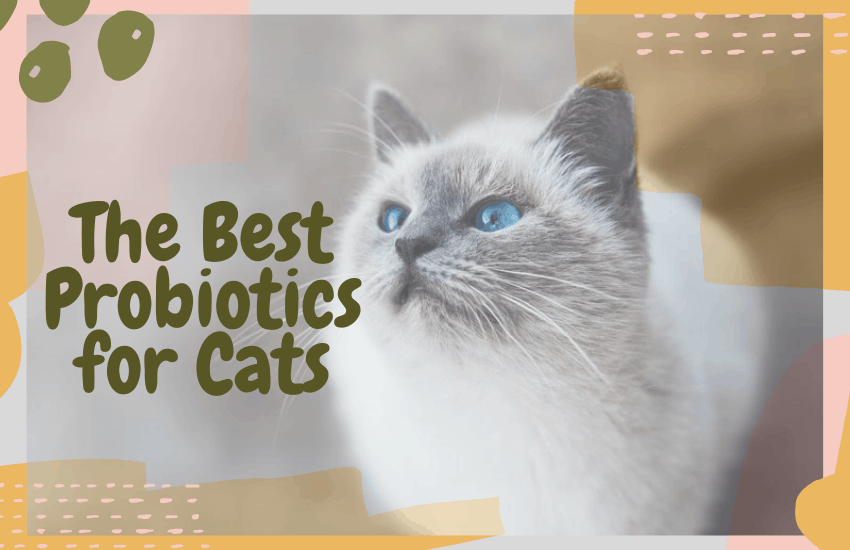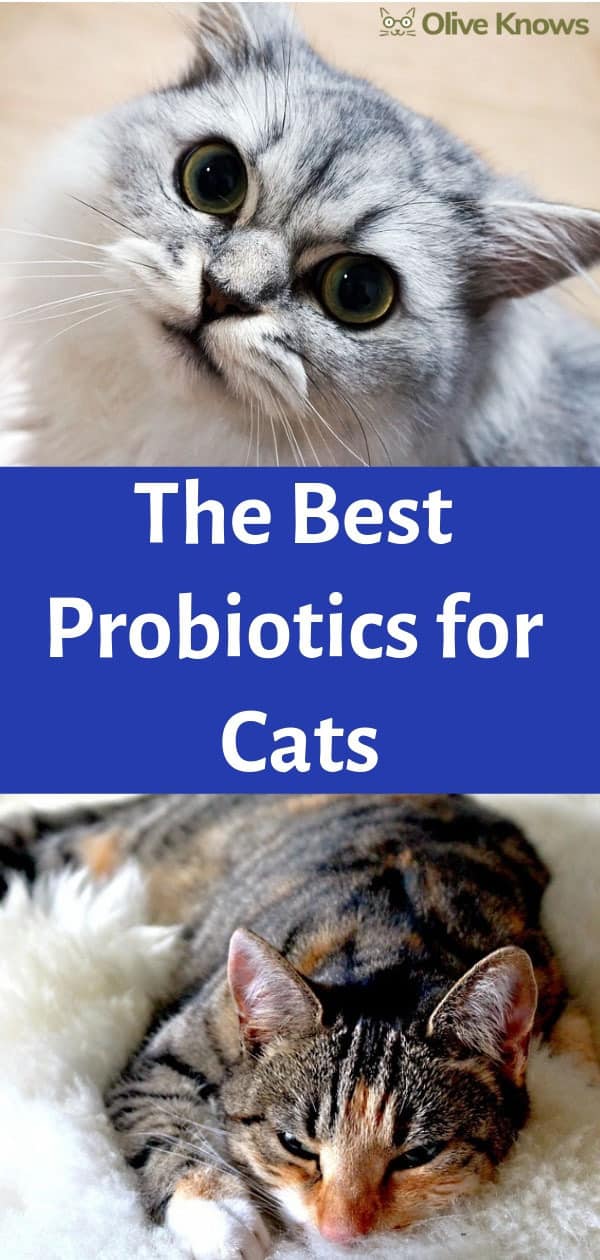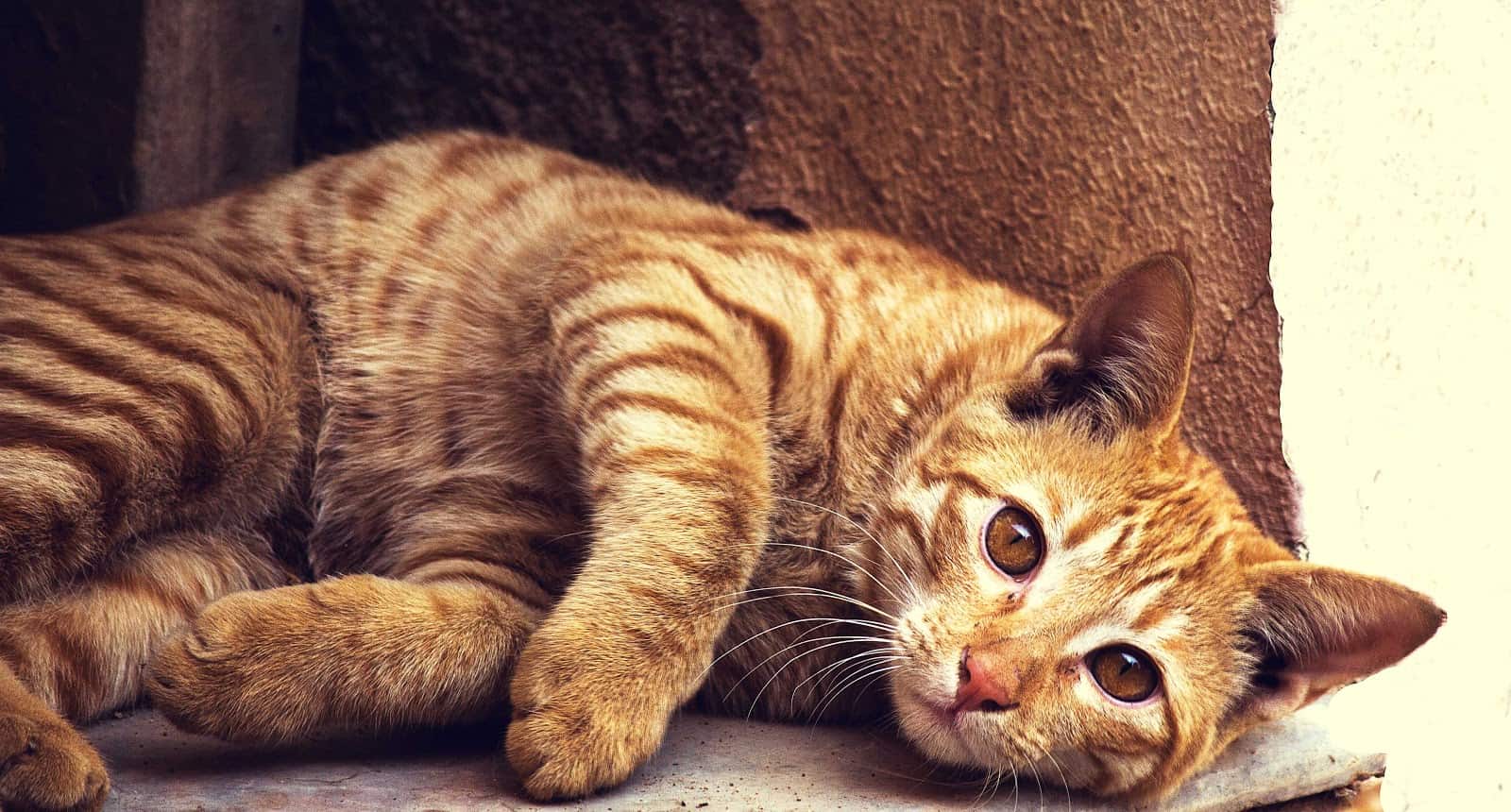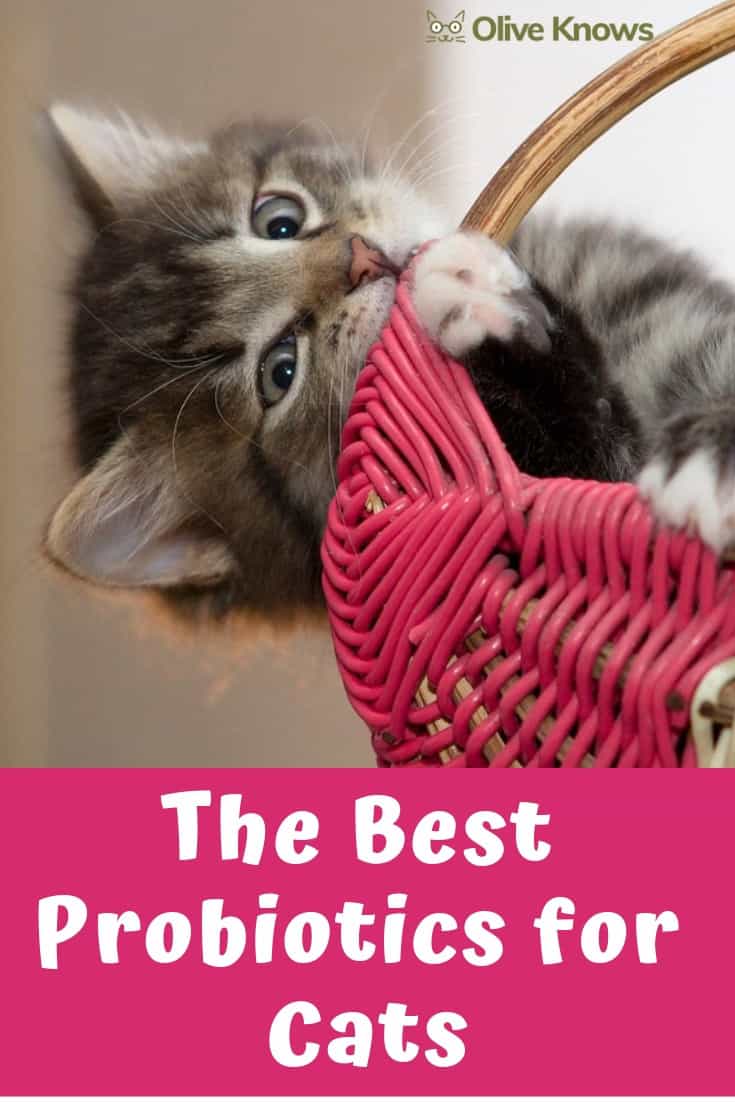
With an influx of products like kombucha and kefir on the market, probiotics are trending with the health and wellness crowd. By now you’ve probably heard all about the benefits of probiotics when it comes to maintaining good gut health, but did you know probiotic supplements can also be used in your cat’s diet?

Table of Contents
What are Probiotics?
To fully understand the possibilities that presenting your cat’s diet with probiotics can have, we have to understand what probiotics are. Probiotics are beneficial bacteria that stimulate the growth of microorganisms that can have positive benefits to the overall health of humans or animals. Typically, the most commonly referred to probiotics reside in the gut and help regulate the digestive issues in their system.
These microorganisms are said to prevent many illnesses and diseases, especially when it comes to the gastrointestinal tract system. In fact, the relationship between bacteria and its host is so interwoven that it can have an impact on basically every aspect of the hosts body.
The intestinal bacteria play a part in metabolism, obesity, allergies, moods, and how well the immune system functions. If the bacteria found in the gut is off balance– or in other words, contains too much unhealthy bacteria– it can cause an imbalance.
An imbalance of bacteria is called gut dysbiosis or intestinal dysbiosis. This imbalance can cause health problems such as chronic liver disease, chronic kidney disease, chronic pancreatitis, asthma, and even Inflammatory Bowel Disease (IBD).
It can also cause chronic inflammation, which can lead to a variety of health issues, so having the right balance of bacteria in the gut is an important key to maintaining the health of both humans and animals.

Benefits of Probiotics
As noted above, incorporating probiotics into your cat’s diet can have a lot of health benefits, especially when it comes to many of the diseases and health concerns experienced by felines. Some common health issues that probiotic supplements help with include:
- Irregular bowel function such as acute diarrhea, constipation, and loose stool
- Obesity
- Skin Rashes
- Excessive shedding
- Yeast infections
- Low vitamin B
One of the most notable ailments cats may suffer from is inflammatory bowel disease or IBD. IBD is one of those things that cats can develop as they get older but the cause of IBD is still relatively unknown. Incorporating probiotics in your cat’s diet could save you a hefty amount of money down the road.
Probiotics have the added benefit of helping with other symptoms of digestive upsets such as loss of appetite and chronic vomiting. Dr. Patrick Mahaney, DVM supports the use of probiotics because they help “promote immune system health” by helping to regulate the digestive tract. This is especially helpful for cats that are on a kibble diet. Since kibble isn’t a food a cat would find in nature, it’s not the healthiest of long-term diets.
The list of benefits when it comes to adding probiotics to your cat’s diet seem endless. Not only do they help repopulate the good bacteria – such as lactobacillus and other good bacterial species in her gut after she’s been on antibiotics, but probiotics also improve digestion and can have a positive impact on her weakened immune system. When it comes to your cat’s overall health, what more could you want?

Side Effects of Probiotics
As always, there has to be a downside or two to balance out the benefits of adding probiotics to your cat’s diet. So, while one of the major benefits of probiotics is their ability to help reduce vomiting and diarrhea in cats, they can also cause an increase in diarrhea. Confused? Allow me to explain.
Since you are essentially introducing a whole new pool of bacteria to your cat’s digestive tract, there can be an imbalance at first. What happens then is the good bacteria and the bad bacteria battle it out until a balance has been achieved. Unfortunately, this can result in the very thing you may have set out to remedy. Don’t worry though! As soon as things have balanced out, your cat should start to experience normal bowel movements.
Adding Probiotics to a Cat’s Diet
If you choose to add probiotics to your cat’s diet, the first thing you should do is consult your vet. Doing so will have a positive impact on both you and your cat during the process for several reasons. First, she will be able to tell you if and how a probiotic will benefit your cat. It’s important to keep in mind that not all probiotics are created equal. Your vet will be able to point you in the direction of probiotics that are made with quality ingredients, giving you tips on administering them to your cat, and what to avoid.
After talking to your vet, it’s time to find the right probiotic for your cat’s diet. Probiotic organisms in human diets have definitely become more mainstream in recent years and we often hear people rave about products with live cultures such as kombucha, kefir, and yogurt. While those products can benefit a human diet, it’s important to note your cat might not react well to them. For that reason, it’s important to look at products that have been designed specifically for felines.
Types of Probiotic Supplements
Probiotic supplements can come in many forms from powders, tablets, and liquids. When it comes to choosing one for your cat, it can depend largely on her preference, as some cats are picky about supplements being added to their food or water.
The most popular form of probiotic supplements designed for cats come in powder form. Choosing a supplement in powder form gives cat parents the most bang for their buck for two reasons. First, a small scoop of a probiotic supplement can contain far more microorganisms than any other form.
Second, when stored appropriately, a container of powder probiotics can last for over a year without going to waste. Powders are also the easiest to administer because they can be mixed with your cat’s water and are relatively tasteless and odorless. When choosing a powder, look for the number of colony-forming units, or CFU, per scoop. Here are some of the most popular probiotic supplements for cats:
| FERA Pet Organics
This formula of 11 different probiotics has been put together by FERA’s veterinarian CEO, Dr. Dulake. There are 5 billion CFUs per scoop. The formula is vegan and wheat free and is tasteless so even the pickiest pet shouldn’t notice the flavor. |
|
| Pet Ultimates
For more variety, Pet Ultimates has twenty different species in their mix, and with no unhealthy fillers. They match Fera with a total of 5 billion CFUs per scoop. Made in the USA, this product comes with a money back guarantee if you’re not completely satisfied (within two weeks). |
|
| FortiFlora
Rather than a scoop, Purina provides their product in dosed sachets. It contains just a single species of bacteria, enterococcus faecium, with a CFU of just over a thousand per kg. Reviews of the product are very positive, with many cat owners saying this had helped their pet with their upset stomachs. |
|
| Premo Pet
Premo has selected six strains for their mix, but they also boast no fillers, or ingredients likely to upset your cat’s stomach. They give you 60 days to try the product and if you aren’t happy you can get a full refund. |
There are still some cats who don’t like to eat food that has anything added to it, no matter how tasteless the makers claim they are! If you have that problem, then consider giving your pet their probiotics in one of the following ways instead:
| Doctors Foster + Smith Probiotic Chews
There are six different probiotics in these chews, including the kind you eat whenever you have yogurt. They are chicken and cheese flavor and look just like a regular treat, so even the most discerning puss will enjoy. |
|
| Probiocin Oral Pet Gel
If you really need to get probiotics into your pet, then this is the sure-fire way to do it. This gel can be squeezed into the mouth, for a cat you need 1g for each 10lbs of body weight. |
|
| Neko Probiotic Food Spray
This spray formula can be stored on the shelf, no need to refrigerate. It tastes great, so your pet is unlikely to refuse if you’ve sprayed this over their kibble or treats. |
Introducing a Probiotic Supplement
After picking a probiotic supplement, it’s time to introduce it into your cat’s diet. As with any other change to your cat’s diet, you should start slow. Since you’ve already consulted your vet on adding the supplement to your cat’s diet, you will have an idea of what to expect in the first few days.
As mentioned previously, a side effect of probiotic supplements is diarrhea. By following the tips you received from your vet as well as the instructions on the package, you might be able to reduce this side effect as it will prevent you from giving her too much at once. Once her digestive system has reached the proper balance of good and bad bacteria, you and your cat will begin to experience the positive effects of probiotics.
Probiotics for Healthy Cats
If your cat has a sensitive stomach, smelly stools or diarrhea then using a probiotic as a treatment seems like a logical choice. But do cats who don’t have these issues need them? The answer is probably not, however, there are some brands of cat food with include pre and probiotics in their food to help aid digestion. If you like the idea of reinforcing your cat’s digestive health without buying another product, then these foods might be just what you’re looking for.
| 4Health Untamed
Packed with protein, this recipe has been designed to reflect a cat’s natural diet. It’s a meat-first recipe, packed with fish oils and including flaxseed for fiber and probiotics to help digestion. |
|
| Wholehearted Grain Free Senior Recipe
Wholehearted have put together a recipe to support cats over the age of 7. A high protein food with chicken as the first ingredient, they’ve reinforced it with vegetables for fiber and added vitamins. Alongside the minerals, including taurine, there are two probiotics.
|
|
| Nature’s Variety Instinct Wet Food
Grain-free and gluten-free, this recipe has no fillers. We’ve done a thorough review of this food which you can read here. Made with omega 3 and 6 to boost health and give a shiny coat alongside those helpful probiotics. |
Choosing a Probiotic Supplement
Probiotic supplements can come in many forms from powders, tablets, and liquids. When it comes to choosing one for your cat, it can depend largely on her preference, as some cats are picky about supplements being added to their food or water.
The most popular form of probiotic supplements designed for cats comes in a powder. Choosing a supplement in powder form gives pet owners the most bang for their buck for two reasons. First, a small scoop of a probiotic supplement can contain far more microorganisms than any other form.
Second, when stored appropriately, a container of powder probiotics can last for over a year without going to waste. Powders are also the easiest to administer because they can be mixed with your cat’s water and are relatively tasteless and odorless. Some of the most popular probiotic supplements for cats come from the brands Pet Ultimates, FortiFlora by Purina, FERA Pet Organics, and Premo Pet.
Introducing a Probiotic Supplement
After picking a probiotic supplement, it’s time to introduce it into your cat’s diet. As with any other change to your cat’s diet, you should start slow. Since you’ve already consulted your vet on adding the supplement to your cat’s diet, you will have an idea of what to expect in the first few days.
As mentioned previously, a side effect of probiotic supplements is diarrhea. By following the tips you received from your vet as well as the instructions on the package, you might be able to reduce this side effect as it will prevent you from giving her too much at once. Once her digestive system has reached the proper balance of good bacteria and the bad bacteria, you and your cat will begin to experience the positive effects of probiotics.
FAQ’s About Cat Probiotics
Are probiotics just for sick cats?
It is well known that probiotics are even more important than vitamins and nutritional supplement can be taken daily. The modern cat diet can bring destruction on the GI tract and gut microbial. Probiotics can be a huge benefit to sick cats, but as a nutritional supplement, they bring added vitality to cats and help to ward off bad conditions. The intestine is your cat’s largest immune system organ, so if there is evidence that your cat (or any animal for that matter) has issues, you must use treatment in the healthiest way possible, by using probiotics.
I already give my cat a multi-vitamin, why take probiotics in addition?
Multivitamins are great, and they provide comprehensive nutritional support to the body. However, only that is only true if your cat has enough of the good bacteria in their body to provide for it to absorb nutrients. Probiotics help support the body in cleaning out the cat’s system of toxins and improve the way the absorb nutrients. A study, in fact, many studies done all over the world, suggest that probiotics are an essential addition to every cat’s diet.
Do probiotics need to be refrigerated?
Usually, a stable, dry probiotic does not require any refrigeration because the drying process suspends the activity of the bacteria until it is reconstituted in the stomach. Surely you can extend the life of probiotics by storing them in a cold place, but you have to be careful not to allow moisture in the materials since that is going to diminish the microorganisms.
Are Probiotic Supplements Worth it?
Choosing to add a probiotic supplement to your cat’s diet is a personal one. While there are many benefits, a probiotic supplement isn’t totally necessary for your cat to live a long life that is both healthy and happy. There are even some instances where cat parents didn’t notice a change in their cat’s health, so your best bet is to discuss it with your vet.
If you do decide to try out a probiotic supplement, do your research. Your vet will know what to look for and what to avoid, so don’t be shy about comparing products before settling on one to buy. Consulting reviews by other cat parents will also go a long way in choosing a probiotic supplement.

